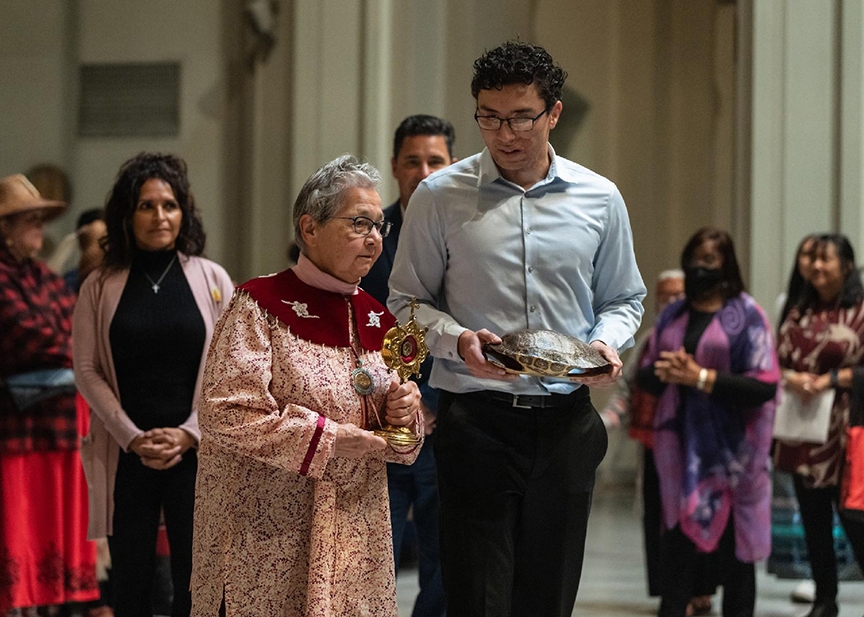
SEATTLE. Celebrating the 10th anniversary of St. Kateri Tekakwitha’s canonization and the local miracle that elevated her to sainthood, Native people and others from around the Seattle Archdiocese gathered for a Mass at St. James Cathedral Oct. 22.
“She was called to be a saint from the day she was born,” said Elsa Finkbonner of Ferndale, whose son Jake was healed from flesh-eating bacteria in 2006 when he was 6. It was the second miracle needed for St. Kateri’s canonization by Pope Benedict XVI on Oct. 21, 2012.
“Her significance in Jake’s healing is clear, it’s precise and it could not have been more planned,” Elsa told the congregation as she shared the story of Jake’s miracle near the conclusion of the Mass.
Jake suffered from a seemingly minor cut to his lip during a basketball game, which developed into an infection with flesh-eating bacteria. Two days later, he was airlifted to Seattle Children’s hospital; the next day, doctors told his parents, Elsa and Donny: “If you guys are praying people, you need to pray, because we’re just trying to save your son’s life,” Elsa recounted.
Father Tim Sauer (who at the time was their pastor at St. Joseph Parish in Ferndale), suggested they pray to then-Blessed Kateri, an Algonquin/Mohawk woman born in the 17th century, for her intercession to heal Jake, who is half Lummi Indian.
The Finkbonners and many others prayed to Kateri. Elsa also recounted how St. Anne Sister Kateri Mitchell, who happened to be in Seattle for a meeting, placed a relic of Blessed Kateri on Jake at the hospital and prayed over him with Elsa.
The next day, Elsa said, doctors told the Finkbonners that the disease ravaging Jake’s body for nearly two weeks had stopped progressing.
Jake, who is now 22 and a student at Western Washington University in Bellingham, also spoke to the congregation to share an “important piece of my family’s story … that God calls us all to be saints.”
He said everyone should be ready to respond to God’s call, whether it’s involuntary – like the call his family had to answer when he was injured – or voluntary.
The voluntary calls, he said, are the opportunities that God gives us to serve. His grandmother is a “fantastic example” of what it means to serve, Jake said. She helped pay for Catholic education for Jake and his sisters, grew a huge garden and gave away most of its harvest, and frequently invited parish priests and parishioners over for dinner.
There are plenty of opportunities for people to serve, Jake said, and they can be as simple as sharing a meal with someone on the street, opening a door for a stranger or picking up a cup of coffee for a coworker.
During the Mass, two large images of St. Kateri were displayed, including an 8-foot-tall icon that usually hangs in the sanctuary of St. Paul Church on the Swinomish Reservation. The icon was placed in a specially made box for safe transport to the cathedral and back.
St. Kateri, the first Native American saint, was orphaned at age 4 and physically scarred by a smallpox epidemic. Later, she was baptized and given the name Catherine – “Kateri” in Mohawk. She devoted her life to teaching prayers to children and helping the sick and aged. When she died at age 24, those at her bedside witnessed her facial scars suddenly disappear a few minutes after death.
Native peoples and culture were honored throughout the celebration of her canonization anniversary. Before Mass began, a statement acknowledging that the cathedral sits on traditional Native land was read, as well as a prayer honoring “all past, present and future Indigenous stewards of these lands and waters.”
During Mass, Seattle Archbishop Paul D. Etienne used a cedar branch, brought by the Native community, to sprinkle the congregation with holy water carried in a special eagle bowl. The bowl, carved by Jimmy Wilbur of the Swinomish Tribe, featured the face of Christ and the cross carved in the eagle’s heart.
The prayer of the faithful included a prayer for St. Kateri’s intercession that was recited by the entire congregation. Shortly before the conclusion of Mass, the Native community presented gifts of blankets, a traditional form of honor, to the archbishop and others.
After Archbishop Etienne gave the final blessing, the congregation processed out of the cathedral accompanied by the drumming of Deacon Scott Aikin, an enrolled tribal member of the Prairie Band of Potawatomi Nation of Northeast Kansas, who serves at Holy Redeemer Parish in Vancouver.
A reception followed at Cathedral Hall, where there was an opportunity to venerate the St. Kateri relic that Sister Kateri Mitchell brought with her to the celebration.









